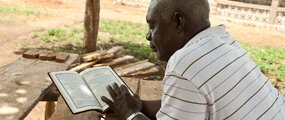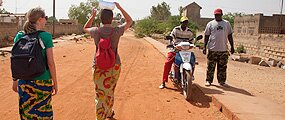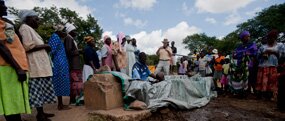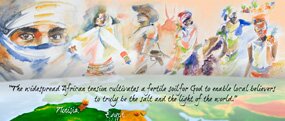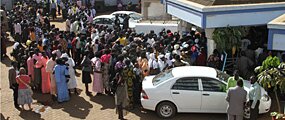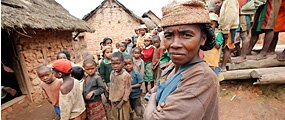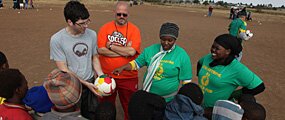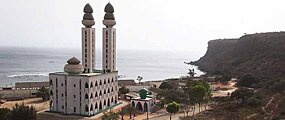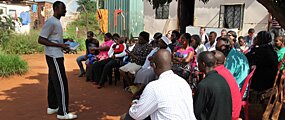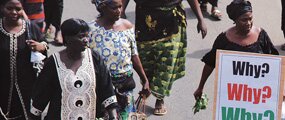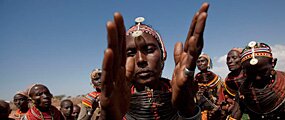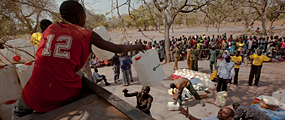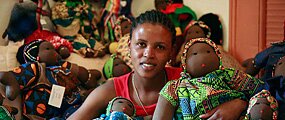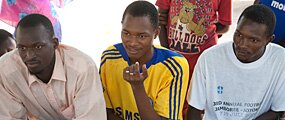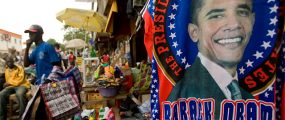Reaching Mungiki
Posted on April 14, 2010
KENYA ¬ A cell phone buzzes in Michael Kabochi’s* pocket. His heart skips a beat as he reads the message threatening his life. It’s not the first threat, nor will it be the last for this Baptist pastor.
Kabochi immediately deletes the text, wishing it were as easy to erase from his mind. He runs long, thin fingers through his closely cropped hair, worry lines crinkling across his forehead. For the hundredth time today he thanks God for the safety of his family. He moved them “up country” months ago at the first sign of trouble, a break-in at his home.
The pastor doesn’t talk much about that day. In fact, no one speaks openly about activities of the quasi-religious sect known as Mungiki, whose young men pray to Mount Kenya and revere traditional African nature spirits. The grisly machete killings, rape, extortion and organized crime that are synonymous with the gang are only mentioned in hushed tones behind closed doors.
That day at Kabochi’s home still weighs heavy on his heart. It changed his life.
“When I came home to that horrible mess, I … ,” he stops midsentence and stares blankly off into the distance. Slowly, a peaceful resolve overtakes Kabochi. He continues but switches topics. “I realized these Mungiki were threatening the lives of people and no one approached them. I prayed for God to give me courage and knowledge on how to talk to them.
“From that day,” the pastor says, “my target became to win more and more Mungiki to Christ.”
Kabochi lives in the midst of the Mungiki stronghold where bogus taxes and beatings are a daily occurrence. Just a few months ago, Kabochi ducked his head and hurried past the loitering young men in dreadlocks, trying desperately to be invisible. Now, he stops to shake hands and chat.
Like the millions of Mungiki followers, Kabochi is Kikuyu, Kenya’s largest ethnic group. This fact alone gains him a voice with the men ages 16-40 involved in the mafia-like sect, but does not protect him from extortion. Threats first began rolling in when Kabochi refused to pay 100 shillings ($1.35) per day for “protecting” his house. Most living in Kabochi’s neighborhood barely have income for food, let alone money to pay bogus taxes.
The pastor’s own income is sparse. Ministry doesn’t come with a guaranteed salary in this neighborhood. He supports his family and ministry by selling leather products he learned to make through a community development program called Business as Mission. Every shilling Kabochi earns goes for food or school fees for his children – there’s never enough money left to pay extortion. As a result, threats of beatings and death haunt the Kenyan daily.
With every threat, Kabochi’s resolve to share Christ with Mungiki followers grows stronger. He tells them Bible stories he learned through training at Business as Mission. He boldly shares Christ with the very men who threaten him.
“I pray for God to give me courage and knowledge on how to approach them [Mungiki],” Kabochi says, walking through the marketplace where he’s been mugged numerous times.
“Am I afraid? No!” he says with a shakiness that betrays his verbal answer. “Let them hear the Gospel. The blood of Jesus was shed for them as much as it was for me.”
 A grungy 20-year-old darts out from behind a small kiosk in the market and falls in-step with the pastor. Vendors watch the young man, Stephens Warugongo*, suspiciously, but Kabochi gives the known troublemaker an enthusiastic slap on the shoulder.
A grungy 20-year-old darts out from behind a small kiosk in the market and falls in-step with the pastor. Vendors watch the young man, Stephens Warugongo*, suspiciously, but Kabochi gives the known troublemaker an enthusiastic slap on the shoulder.
The two enter a small courtyard and Warugongo rushes over to a group of men decked out in baggy clothes, giving each a “fist punch” greeting. Kabochi explains these are just a few of hundreds who left Mungiki to follow Christ in the last several months.
“I can’t explain it really,” Kabochi says, pointing to Warugongo and his friends. The young men position chairs, crates and stools around the yard, readying it for Bible study. “It is a miracle. A few weeks ago, these young men were hooligans. They came to this group and robbed us. They threatened us with guns and knives. They took our money and cell phones.”
Warugongo lowers his head at the mention of his recent past. He spent years drinking and taking drugs. He collected illegal taxes and stole from anyone he came in contact with – even his own mother. People were afraid of the havoc he wreaked. Scars on his fists and forearms attest to the many beatings he’s dished out. But, the day he drew his knife on Kabochi’s Bible study group was the day his life changed. The pastor lead the group in praying for the Mungiki thieves to come back to hear the Bible stories and ask for forgiveness. One week later, the robbers returned, asking to learn about Jesus’ love.
“I’m here because she prayed for me,” Warugongo says, pointing to a woman who just moments earlier shared her Bible with the former Mungiki member. “She prayed my life would change and now it has.”
As Warugongo shares his testimony for the first time, Kabochi basks in the excitement of this new believer. His smile is short lived when his phone vibrates, indicating the possibility of another threat.
Before checking the incoming message, he glances at the nine former Mungiki sect members who at one time or another personally threatened him with guns, knives or fists. They sit congratulating Warugongo while pouring over an open Bible. One by one they practice telling the Bible story Kabochi just taught. All hope to share it with their friends who are still active in Mungiki. They desire for even more to know this newfound forgiveness and peace filling their hearts.
The pastor’s smile slowly returns when he thinks of the many who will hear God’s story today from the mouths of these young men. He stuffs the phone back in his pocket, without even reading the text.
“Now is not the time to worry or fear for our lives,” Kabochi says softly. “It is time to thank God for what He is doing among the Mungiki. He is changing the hearts of hardened criminals.”
*Names changed for security reasons










